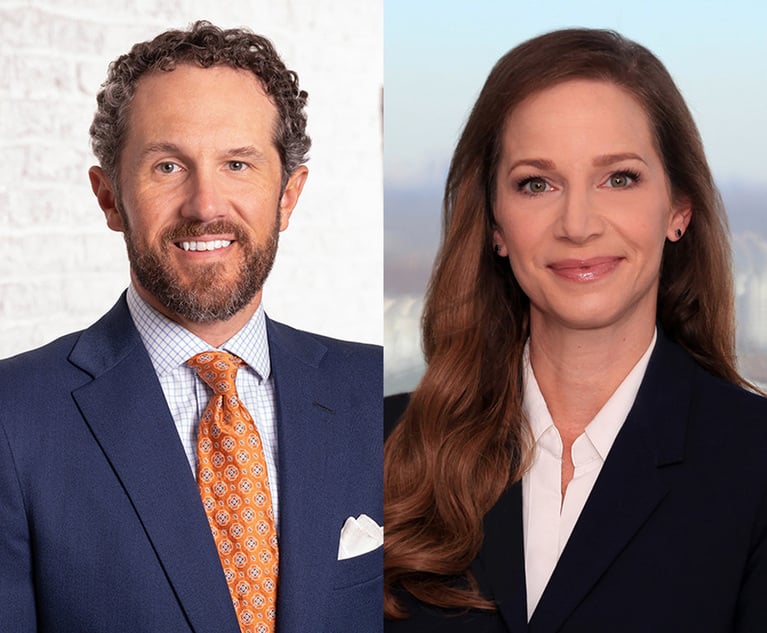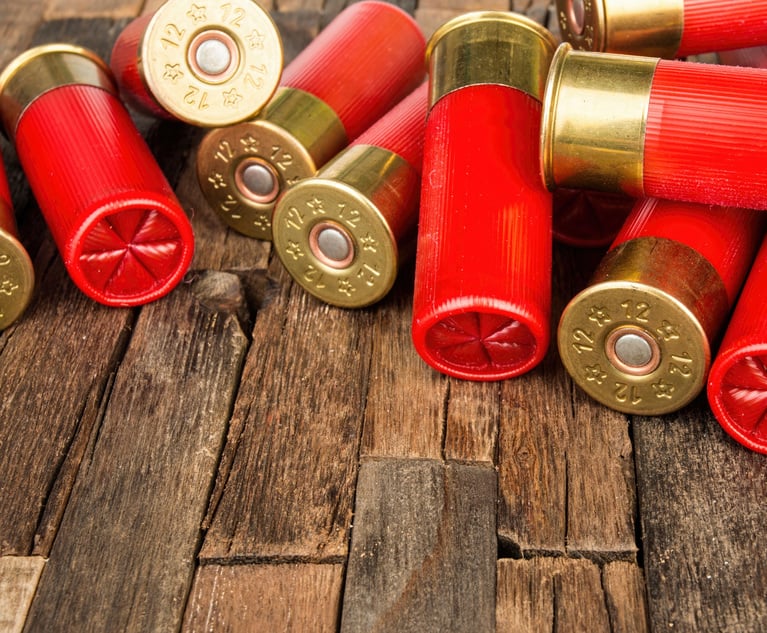Appeals Court Upholds Sanctions Against Dallas Lawyer for Use of 'Push Poll' to Sway Jury Pool
A Texas Court of Appeals has affirmed $177,000 in sanctions against William Brewer III after a trial court ruled the prominent Dallas attorney engaged…
March 27, 2018 at 03:55 PM
6 minute read

A Texas Court of Appeals has affirmed $177,000 in sanctions against William Brewer III after a trial court ruled the prominent Dallas attorney engaged in abusive litigation tactic by commissioning a pretrial telephone survey meant to improperly influence a jury pool in a wrongful death case.
In 2016, 72nd District Court Judge Ruben Reyes of Lubbock found that Brewer was responsible for conducting a poll over issues in Ken Teel v. Titeflex, a case in which Brewer was defending Titeflex, a company accused of manufacturing faulty flexible gas tubing that allegedly caused a deadly house fire.
The practice of conducting a poll aimed at shaping, rather than measuring, opinion is colloquially called “push-polling.”
Brewer, now of Brewer Attorneys & Counselors, approved of poll questions that were “designed to influence or alter their opinions or attitude of the person being polled,” Reyes ruled. And the pollster Brewer hired to conduct the survey eventually contacted witnesses and parties involved in the Titeflex litigation to ask them the questions, according to the ruling. Reyes even found his own name on the pollster's database call list.
In a lengthy response to the sanctions motion filed by the plaintiffs in the case, Brewer argued that he did nothing wrong, that his “jury focus exercise” was ethical, and that no state law, rule or court decision prevents lawyers from commissioning jury surveys. Brewer also “expressed sincere regret for the unforeseen, inadvertent contact made with certain people related to the case.”
But Reyes was unimpressed with Brewer's explanation and even less so with the live testimony he gave during a sanctions hearing noting that the attorney appeared “nonchalant and uncaring” about his actions.
“The court finds Mr. Brewer's actions were not merely a negligent act, a mistake or the result of poor judgment, and Mr. Brewer's explanation that he bears clean hands because the poll was a blind study conducted by a third party vendor is insulting to the court,” Reyes wrote in his ruling sanctioning Brewer.
Brewer appealed the sanctions order to Amarillo's Seventh Court of Appeals, arguing that his punishment should be overturned because the telephone survey was a litigation tactic that amounted to legitimate research.
However four Bar groups later filed an amici brief urging the Seventh Court to uphold Brewer's sanctions, arguing that punishing Brewer for using a so-called “push poll” during litigation is so important that the constitutional right to a trial by jury in civil cases depended on it.
The Seventh Court seemed to agree, beginning the first line of its 30-page decision by quoting Article I of the Texas Constitution which states: “The right of a trial by jury shall remain inviolate.”
“If the right to a civil jury trial, enshrined in both the Seventh Amendment to the United States Constitution and Article I of the Texas Constitution, is going to signify anything at all, it must denote the right to a fair and impartial jury,” wrote Justice Patrick Pirtle. “Any conduct that erodes that fundamental core principle erodes public confidence in the entire judicial process.”
“Here the trial judge was faced with serious allegation that attorneys for one party had consciously attempted to preemptively tip the balance of a fair trial in favor of their clients,” Pirtle wrote. “Under the record before this court, we cannot say the trial judge abused his discretion in imposing those sanctions.”
Pirtle rejected Brewer's arguments that the trial court abused its discretion by punishing him because his use of pre-trial surveys was not done in bad faith. After all, Brewer argued, no rule or ethics opinion prohibited the use of a pre-trial survey.
“Brewer contends that the absence of express authority directly prohibiting this conduct operates as implied permission to conduct such surveys. This is a logical fallacy,” Pirtle wrote.
“Such an argument fails to account for the inherent power of the trial court to oversee the trial of a cause of action or the interplay of the rules of professional conduct and ethics on unforeseen efforts to impact the outcome of a trial or to influence a witness,” Pirtle wrote. “In that regard, Texas appellate courts have consistently held that a trial court has the inherent power to sanction litigants and attorneys whose abusive conduct affects a court function of the judiciary and this power exists regardless of whether the conduct is specifically proscribed by rule or statute.”
Brewer did not immediately return a call for comment.
Timothy T. Pridmore, a partner in Lubbock's McWhorter, Cobb and Johnson who represented Brewer in the case said he respectfully disagrees with the Seventh Court's decision.
“The record demonstrates that Mr. Brewer acted in accordance with his legal and ethical obligations,” Pridmore said. “We are closely evaluating our options, but do look forward to continuing to bring the facts into public view.”
Michael J. Collins, a partner at Brewer, Attorneys & Counselors said, “There is nothing our firm takes more seriously than its ethical obligations. We have great respect for the trial court and the appellate court, but do believe Mr. Brewer and our firm acted appropriately at all times.”
Ted Lyon, a Dallas lawyer who represents the plaintiffs who originally pursued sanctions against Brewer, is pleased with the decision.
“They did a very good job of explaining why we should prohibit this type of behavior,” Lyons said. “It's a very big deal when you have this kind of activity where they are having people call potential jurors and trying in intimidate witnesses. The behavior was outrageous.”
Brian Lauten, a Dallas attorney who wrote amicus brief for four Bar groups that urged the court to uphold Brewer's sanctions, said he was thrilled with the ruling.
“We could not applaud Judge Reyes and the Amarillo Court of Appeals any more than we are for refusing to condone misconduct that undermines the very fabric to the right to a fair and impartial civil jury trial, '' Lauten said.
Lauten wrote his amicus brief on behalf of the American Board of Trial Advocates, the Texas Chapter of the American Board of Trial Advocates, the Texas Trial Lawyers Association and the Texas Association of Defense Counsel.
“The common thread of all of those organizations is reverence for the Seventh Amendment and the right to a jury trial,” Lauten said. “Brewer's conduct rocked the core of that very principle.''
This content has been archived. It is available through our partners, LexisNexis® and Bloomberg Law.
To view this content, please continue to their sites.
Not a Lexis Subscriber?
Subscribe Now
Not a Bloomberg Law Subscriber?
Subscribe Now
NOT FOR REPRINT
© 2024 ALM Global, LLC, All Rights Reserved. Request academic re-use from www.copyright.com. All other uses, submit a request to [email protected]. For more information visit Asset & Logo Licensing.
You Might Like
View All
Overtime Rewind: Texas Court Ruling Unravels FLSA Salary Level Increases
4 minute read
Divided 5th Circuit Shoots Down Nasdaq Diversity Rules

Uvalde Shooting 'Fresh in Everyone's Mind:' Lone Dissenting Judge Disagrees with School's Disciplinary Decision Over Pellet Gun

Amazon, SpaceX Press Constitutional Challenges to NLRB at 5th Circuit
Trending Stories
- 1'Largest Retail Data Breach in History'? Hot Topic and Affiliated Brands Sued for Alleged Failure to Prevent Data Breach Linked to Snowflake Software
- 2Former President of New York State Bar, and the New York Bar Foundation, Dies As He Entered 70th Year as Attorney
- 3Legal Advocates in Uproar Upon Release of Footage Showing CO's Beat Black Inmate Before His Death
- 4Longtime Baker & Hostetler Partner, Former White House Counsel David Rivkin Dies at 68
- 5Court System Seeks Public Comment on E-Filing for Annual Report
Who Got The Work
Michael G. Bongiorno, Andrew Scott Dulberg and Elizabeth E. Driscoll from Wilmer Cutler Pickering Hale and Dorr have stepped in to represent Symbotic Inc., an A.I.-enabled technology platform that focuses on increasing supply chain efficiency, and other defendants in a pending shareholder derivative lawsuit. The case, filed Oct. 2 in Massachusetts District Court by the Brown Law Firm on behalf of Stephen Austen, accuses certain officers and directors of misleading investors in regard to Symbotic's potential for margin growth by failing to disclose that the company was not equipped to timely deploy its systems or manage expenses through project delays. The case, assigned to U.S. District Judge Nathaniel M. Gorton, is 1:24-cv-12522, Austen v. Cohen et al.
Who Got The Work
Edmund Polubinski and Marie Killmond of Davis Polk & Wardwell have entered appearances for data platform software development company MongoDB and other defendants in a pending shareholder derivative lawsuit. The action, filed Oct. 7 in New York Southern District Court by the Brown Law Firm, accuses the company's directors and/or officers of falsely expressing confidence in the company’s restructuring of its sales incentive plan and downplaying the severity of decreases in its upfront commitments. The case is 1:24-cv-07594, Roy v. Ittycheria et al.
Who Got The Work
Amy O. Bruchs and Kurt F. Ellison of Michael Best & Friedrich have entered appearances for Epic Systems Corp. in a pending employment discrimination lawsuit. The suit was filed Sept. 7 in Wisconsin Western District Court by Levine Eisberner LLC and Siri & Glimstad on behalf of a project manager who claims that he was wrongfully terminated after applying for a religious exemption to the defendant's COVID-19 vaccine mandate. The case, assigned to U.S. Magistrate Judge Anita Marie Boor, is 3:24-cv-00630, Secker, Nathan v. Epic Systems Corporation.
Who Got The Work
David X. Sullivan, Thomas J. Finn and Gregory A. Hall from McCarter & English have entered appearances for Sunrun Installation Services in a pending civil rights lawsuit. The complaint was filed Sept. 4 in Connecticut District Court by attorney Robert M. Berke on behalf of former employee George Edward Steins, who was arrested and charged with employing an unregistered home improvement salesperson. The complaint alleges that had Sunrun informed the Connecticut Department of Consumer Protection that the plaintiff's employment had ended in 2017 and that he no longer held Sunrun's home improvement contractor license, he would not have been hit with charges, which were dismissed in May 2024. The case, assigned to U.S. District Judge Jeffrey A. Meyer, is 3:24-cv-01423, Steins v. Sunrun, Inc. et al.
Who Got The Work
Greenberg Traurig shareholder Joshua L. Raskin has entered an appearance for boohoo.com UK Ltd. in a pending patent infringement lawsuit. The suit, filed Sept. 3 in Texas Eastern District Court by Rozier Hardt McDonough on behalf of Alto Dynamics, asserts five patents related to an online shopping platform. The case, assigned to U.S. District Judge Rodney Gilstrap, is 2:24-cv-00719, Alto Dynamics, LLC v. boohoo.com UK Limited.
Featured Firms
Law Offices of Gary Martin Hays & Associates, P.C.
(470) 294-1674
Law Offices of Mark E. Salomone
(857) 444-6468
Smith & Hassler
(713) 739-1250






